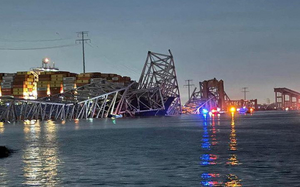Washington: The cargo ship Dali that hit and destroyed the Francis Scott Key Bridge in Baltimore, Maryland, in March had experienced a loss of electrical power and propulsion before the incident, according to a preliminary report released by the US National Transportation Safety Board (NTSB).
The report pieces together a detailed timeline of the events that occurred in the time leading up to the Dali striking pier no. 17 of the Key Bridge, the bridge’s subsequent collapse and initial search and rescue and recovery efforts for the road maintenance crewmembers, reports Xinhua news agency.
The Singapore-flagged steel-hulled general cargo vessel was 0.6 miles (0.96 km) — or three ship lengths — from the Key Bridge when electrical breakers that fed most of the vessel’s equipment and lighting unexpectedly opened.
This caused the first blackout to all shipboard lighting and most equipment, including the main engine cooling water pumps and steering gear pumps, said the report, adding that the loss of electrical power stopped all three steering pumps, and, therefore, the rudder was unable to be moved.
The Dali crew was able to restore electrical power to the vessel, but when the ship was 0.2 miles (0.32 km) from the bridge, a second electrical blackout occurred.
The Dali’s starboard bow struck pier no. 17 of the Key Bridge at 6.5 knots. Six spans of the bridge subsequently collapsed into the water and across the ship’s bow, it said.
On March 25, about 10 hours before leaving Baltimore, the Dali experienced a blackout during in-port maintenance when a crewmember mistakenly closed an inline engine exhaust damper.
According to the report, the crewmembers restored vessel power before a second blackout occurred, which was related to insufficient fuel pressure for the online generator.
“Of the 4,680 containers on board the vessel at the time of the accident, 56 were identified as containing dangerous goods,” it said.
The US Coast Guard classified the accident as a major marine casualty. Six road maintenance workers on the bridge were killed in the tragic event.
Officials said last week that they recovered the body of the sixth and final worker who had been missing after the bridge collapse.
The NTSB officials said that an investigation of all aspects of the accident is ongoing as they determine the probable cause. The agency will continue evaluating the design and operation of the ship’s power distribution system, including its breakers.
Examination of damage to the vessel will also continue when the ship is clear of debris and moved to a shoreside facility.
On Monday, a controlled precision-cut demolition was conducted to break down a large steel section of the collapsed bridge, aiming to free the cargo ship from the fallen structure.
IANS


Comments are closed.